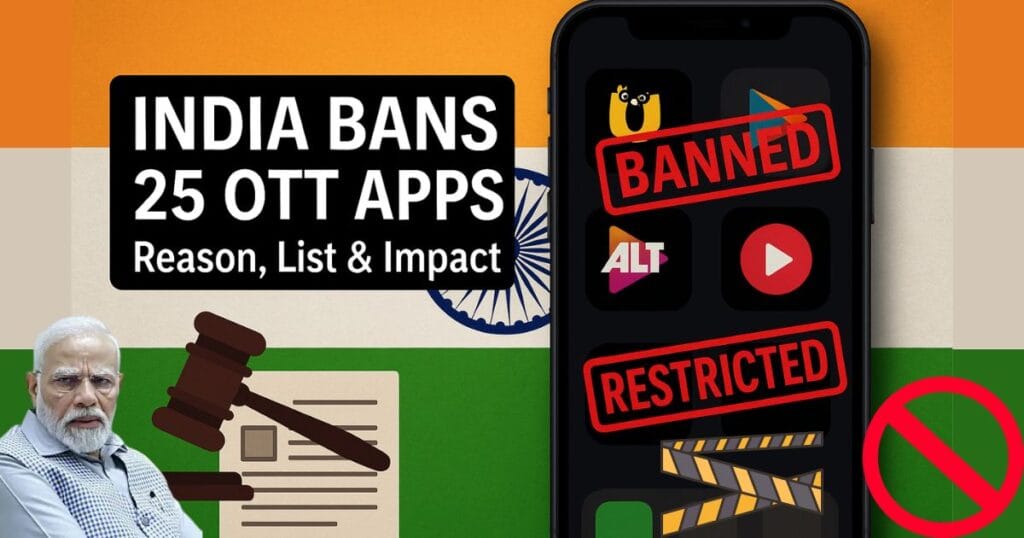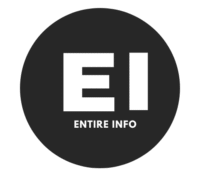The Indian government recently imposed a ban on 25 Over-the-Top (OTT) streaming apps. This decision was taken by the Ministry of Information and Broadcasting due to the nature of content on these platforms—described as obscene, vulgar, and potentially harmful to society.

In this article, we’ll break down the reasons behind the ban, list the affected apps, explain the kind of content they were showing, and discuss the impact of this move on both society and the OTT industry. We’ll also dive into the broader debate: is this a necessary step to protect public morals, or a blow to creative freedom in Digital India?
Why Did the Government Ban These 25 OTT Apps?
The main reason behind this ban was the kind of web series and videos these platforms were streaming—content that violated moral standards and legal boundaries.
The Ministry of Information and Broadcasting stated that these platforms were promoting obscene and inappropriate material, which could negatively influence children and the larger public.
Multiple complaints had been filed against these apps by organizations like the National Commission for Protection of Child Rights (NCPCR) and others. Acting on these complaints, the government invoked:
- IT Act 2000 (Sections 67 & 67A)
- Indian Penal Code (Section 292)
- The Indecent Representation of Women (Prohibition) Act, 1986
The goal- protect public values and safeguard children from harmful content.
Why was this step needed?
- Exposure to obscene content can have long-term psychological effects on children and youth.
- Upholding moral and social values is essential for a healthy society.
- Legal enforcement ensures a responsible digital ecosystem.
Which OTT Apps Were Banned?
The ban includes 25 OTT apps, many of which were gaining popularity. Here’s the full list:
- ALTT
- Ullu
- Desiflix
- Big Shots App
- Boomex
- Navarasa Lite
- Gulab App
- Kangan App
- Bull App
- Jalva App
- Wow Entertainment
- Look Entertainment
- Hitprime
- Feneo
- ShowX
- Sol Talkies
- Adda TV
- HotX VIP
- Hulchul App
- MoodX
- NeonX VIP
- Fugi
- Mojflix
- Triflicks
In addition, 26 related websites and 14 mobile apps were also blocked. Of these, 9 apps were removed from Google Play Store, and 5 from Apple App Store.
Note: This list is based on reports from credible sources like Indian Express and Hindustan Times.
What Kind of Content Did These Apps Stream?
The majority of these platforms were showing web series and videos with sexually explicit scenes, suggestive stories, and inappropriate relationships.
For instance
- Ullu featured series with unnecessary nudity and sexually provocative plots that lacked substance.
- ALTT was criticized for content labeled as “vulgar and bizarre,” where explicit visuals existed without meaningful storytelling.
- Other platforms depicted socially unacceptable narratives, including inappropriate relationships and exploitative storylines.
Such content can harm young minds, desensitize audiences, and contribute to declining social values—hence the ban was deemed necessary.
What Was the Government’s Official Order?
On July 23, 2024, the Ministry of Information and Broadcasting issued a directive to all internet service providers to block access to these 25 apps and associated websites.
Before finalizing the order, the government consulted the Home Ministry, Ministry of Women and Child Development, and legal experts. Many of these platforms had already received prior warnings but failed to comply.
Order Summary:
- Blocked: 26 websites + 14 apps.
- Removed: 9 apps from Google Play, 5 from Apple App Store.
- Legal Framework: IT Act 2000, IT Rules 2021, IPC, and related laws.
For official details, refer to coverage by Newsonair.
Are These Apps Completely Inaccessible Now?
Yes, these apps are officially blocked in India. Their websites are inaccessible, and their apps are no longer available on app stores.
However, some users may try to bypass the block using VPNs (Virtual Private Networks). While technically possible, it comes with serious risks.
- It’s illegal: Violating a government ban could land you in trouble.
- Security threats: VPNs can expose your device to hacking or malware.
- Data theft: Your sensitive info like bank details could be at risk.
Bottom line- It’s always safer to stick with legal and verified platforms.
Why Is Content Regulation Necessary in the Digital Space?
Today, the internet offers unrestricted access to all kinds of content. But that doesn’t mean everything should be available to everyone, especially vulnerable groups like children.
Why content control matters
- Protecting children: Inappropriate content can harm mental and emotional development.
- Preserving values: Morality and decency are essential pillars of a balanced society.
- Legal compliance: Publishing obscene content is a punishable offense under Indian law.
That said, while regulation is important, it must not stifle creative freedom or artistic expression unnecessarily.
How Will This Affect the OTT Industry?
This move is expected to disrupt smaller platforms like Ullu and ALTT, which relied heavily on adult content for engagement.
Meanwhile, larger platforms like Netflix and Amazon Prime may become even more cautious in curating content.
Potential Impact
- Smaller platforms: May shut down or drastically change their content strategy.
- Bigger platforms: Might increase self-censorship, which could limit creative storytelling.
- Long-term shift: Could lead to a more responsible OTT ecosystem, focused on both entertainment and ethics.
The industry might now lean towards content that entertains without compromising societal values.
Important Warnings for Viewers
If you were a regular user of these apps, here are a few things to keep in mind:
- Cybersecurity risks: Unofficial apps or VPN use can expose your device to malware.
- Data theft: Personal info like passwords and bank details can be stolen.
- Legal trouble: Accessing banned apps may have legal consequences.
Lesson– Always use safe, legal platforms, and be mindful of what you’re watching online.
Obscenity vs. Freedom of Expression in Digital India
Bans 25 OTT Apps has reignited a critical debate- Was it a necessary step to protect society, or a clampdown on freedom of expression?
Arguments in support of Bans 25 OTT Apps
- Obscene content negatively affects children and society.
- Legal bans help enforce decency and morality.
- It promotes a healthier digital environment.
Arguments against of Bans 25 OTT Apps
- It amounts to censorship, limiting creators’ voices.
- Over-regulation can kill innovative and bold storytelling.
- It can infringe on individual freedom and artistic liberty.
Truth is, both sides have valid concerns. The challenge for the government is to find a balanced approach—one that protects public interest without suffocating creativity.
Conclusion: Was the Ban Justified?
In my opinion, the ban was partially necessary. The content on these apps was indeed harmful, especially for children and impressionable viewers.
However, the government must also ensure that such measures don’t turn into blanket censorship. Moving forward, collaboration between policymakers and OTT platforms is essential to build a digital ecosystem where entertainment coexists with responsibility.
This ban is a reminder that with great freedom comes greater responsibility—and the digital world needs both freedom and accountability in equal measure.
What do you think? Was this ban necessary, or did it go too far? Share your thoughts in the comments!
READ OFFICIAL Newson AIR Article on Bans 25 OTT Apps
Key Details of the OTT App Ban
| Point | Details |
|---|---|
| Number of Platforms | 25 OTT apps, 26 websites, 14 mobile apps blocked |
| Order Date | July 23, 2024 |
| Legal Basis | IT Act 2000, IT Rules 2021, IPC, Indecent Representation of Women Act |
| Content Concerns | Obscene, vulgar, and socially harmful content |
| App Store Actions | 9 apps removed from Google Play, 5 from Apple App Store |
| User Impact | Cybersecurity risks, data theft, legal issues |
| Impact on OTT Industry | Smaller platforms may shut down; larger ones to adopt stricter self-control |
ALSO READ- Digital Consent Pilot Project: A Game-Changer for Stopping Spam Calls in India
Why did the Indian government ban 25 OTT apps like Ullu and ALTT?
The Indian government banned 25 OTT apps, including Ullu and ALTT, due to content featuring nudity, obscenity, and themes harmful to children and society. The Ministry of Information and Broadcasting took action under IT laws and child protection regulations after receiving multiple complaints.
Which OTT apps were banned in India in July 2024?
A total of 25 OTT apps were banned, including popular platforms like Ullu, ALTT, Desiflix, and Big Shots App. Along with these, 26 related websites and 14 mobile apps were also blocked. Some apps were removed from Google Play Store and Apple App Store as well.
Is it illegal to use banned OTT apps in India using VPN?
Yes, accessing banned OTT apps via VPN in India can be considered illegal and may violate government orders. It also exposes users to cybersecurity threats, malware, and data theft. It’s safer to use legal and regulated streaming platforms.


